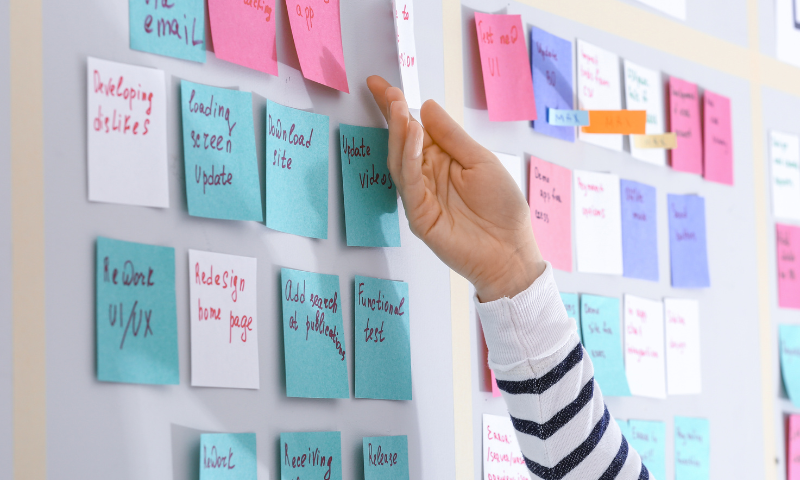As an internal recruiter, hiring manager, CEO or HR professional, you’ll know that job interviews are a critical step in the hiring process. Globally, the average number of interviews carried out by employers before making a job offer is 17 (taking into account that many candidates will attend multiple interview stages). That’s a lot of interviewing!
So, how can you ensure that you’re not wasting time on interviews and that they’re effective in helping you identify the best candidates? Whether you're conducting interviews in person or remotely, there are several things you can do to get the most out of the process. Here are just some of our tips to help:
(1) Prepare in advance
Never just ‘wing it.’ Even if you’ve carried out a thousand interviews before, be sure to tailor each one to the role and candidate. Clearly define your interview process and timelines beforehand. Make sure you’re setting enough time aside for the interview, and try to plan an agenda beforehand, with approximate timescales. Take time to review the candidate's resume and recruiter’s briefing ahead of the interview to get a sense of their skills and experience. Next, prepare a list of questions that’ll help you avoid bias and assess whether they’re a good fit for the role and the company culture.
Importantly, remember that an interview is often a candidate’s first impression of a company. Stats show that 70% of jobseekers turn down a job if their first impression is substandard. Don’t put them off by seeming disorganised or uninterested.
(2) Create a positive environment
Creating a positive environment that promotes good health and wellbeing can boost employee morale, engagement, and productivity. So, it’s important to create an attractive and inclusive environment from the off. Whether you're interviewing in person or remotely, create a positive, professional environment that’ll help put a diverse range of candidates at ease.
Make sure the interview space is clean and comfortable. Think about lighting, air temperature, ergonomics, and an aesthetically pleasing workspace. And if you're conducting a remote interview, test your audio and/or video equipment in advance. Again, consider those first impressions. You want the candidate to feel excited about working for your business and in your workplace.
(3) Use a blend of behavioural and competency interview techniques
A great tactic for conducting an interview is using a combination of both behavioural and competency questions.
Behavioural interview questions are designed to help you understand how a candidate has responded to situations in the past, which will provide you with insight into how they might perform in the future. Ask open-ended questions that require the candidate to give specific instances of their experience. Examples include questions that start with “Tell me about a time you had to…”, “Describe how you deal with…”, or “Give me an instance when…”.
Meanwhile, competency questions, allow you to deep dive into a person’s experience, skills and personality. Examples of competency questions would be “Describe your approach to handling conflict resolution with a colleague,” or "How do you reward hard work from your team members?”
Strike a balance between these two approaches for the most accurate insight into every candidate.
(4) Evaluate the candidate's skills
An interview is the prime time to evaluate the candidate's skills and experience. So, this is where tailoring questions to the candidate and role is particularly valuable. Ask them to provide specific examples of their work (using those behavioural-style questions) and make sure you’re digging for specifics that will help you assess whether they have the skills and experience necessary to perform the job.
(5) Evaluate culture fit
Poor cultural fit can cost an organisation between 50-60% of the person’s annual salary. Not to mention the fact that when employees feel misaligned with corporate culture, they lack a feeling of belonging that can severely impact their performance. That’s why, in addition to evaluating the candidate's skills, it's important to assess whether they’ll be a good fit for the company culture. To learn more about their potential fit, enquire about an individual’s work style, their values, and their communication style to get a sense of whether they’re right for your team.
Have a look at our blog on recruiting for cultural fit here and find out more!
(6) Build rapport
Building rapport with candidates will help you establish trust and get a better sense of their personality and work style. Start by introducing yourself and giving the candidate an overview of the position and the company. Of course, workplace cultures differ, as do interview styles and personalities. But, as a rule of thumb, aim to be friendly, whilst remaining professional.
Even if you don’t think the person’s right for your business or the role on offer, always treat them with respect. Keep the door open - remember they may have a friend to recommend, or they may be perfect for a future opening you have. Also, ensure you provide opportunities for every candidate to ask questions – interviews are as much about candidates deciding about the job, as they are you making a decision about them.
(7) Listen carefully
During the interview, make sure you’re actively listening to the candidate's responses. Take notes if necessary and ask follow-up questions to clarify any points that are unclear. This will show them you’re interested in them and that you value their response. You’ll also put them at ease.
But just as important as verbal cues are non-verbal cues. Be attentive to a candidate’s body language, for instance, for deeper insight into their suitability.
(8) Wrap up the interview
At the end of the interview, thank the candidate for their time and provide them with an overview of the next steps in the hiring process. Let them know when they can expect to hear back from you, and try to keep to any timescales you provide.
Give them another opportunity to ask any questions and provide answers. Reassure them that you’ll be in touch with details of anything you’re unable to respond to immediately.
Importantly, whether successful or not, always provide candidates with feedback once you’ve made your final decision. This is not only useful for them, but contributes towards a positive candidate experience, enhancing your reputation and employer brand.
In conclusion, job interviews are most successful when you’re prepared. It takes skill and attention to detail to carry them out well. Ultimately, they’re the perfect opportunity for you to sell your business and to ensure every candidate walks out of the door wanting the job.
By following our tips and putting in the work, you’re more likely to increase your chances of enhancing your employer brand and identifying the best candidates for the job – plus, of course, keeping them for the long term.
Remember, Apollo Solutions is here to help and provide advice at every step of the way. We have vast experience in helping our clients in the Corporate Governance & Technology space reduce their time to hire by reviewing and optimising their interview process, ensuring a smooth turnaround. We'll take the hassle out of interviewing, only putting the best, most relevant candidates forward to save you time and money as you grow your team. Get in touch to find out more.




